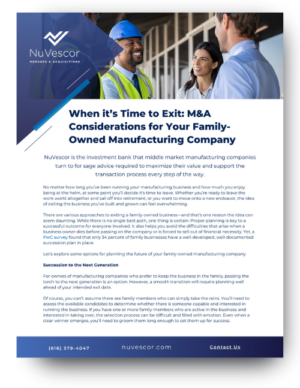No matter how long you’ve been running your manufacturing business and how much you enjoy being at the helm, at some point you’ll decide it’s time to leave. Whether you’re ready to leave the work world altogether and sail off into retirement, or you want to move onto a new endeavor, the idea of exiting the business you’ve built and grown can feel overwhelming.
There are various approaches to exiting a family-owned business—and that’s one reason the idea can seem daunting. While there is no single best path, one thing is certain: Proper planning is key to a successful outcome for everyone involved. It also helps you avoid the difficulties that arise when a business owner dies before passing on the company or is forced to sell out of financial necessity. Yet, a PwC survey found that only 34 percent of family businesses have a well-developed, well-documented succession plan in place.
Let’s explore some options for planning the future of your family-owned manufacturing company.
Succession to the Next Generation
For owners of manufacturing companies who prefer to keep the business in the family, passing the torch to the next generation is an option. However, a smooth transition will require planning well ahead of your intended exit date.
Of course, you can’t assume there are family members who can simply take the reins. You’ll need to assess the available candidates to determine whether there is someone capable and interested in running the business. If you have one or more family members who are active in the business and interested in taking over, the selection process can be difficult and filled with emotion. Even when a clear winner emerges, you’ll need to groom them long enough to set them up for success.
Since the value of the business is likely to make up the lion’s share of your net worth, you’ll need to look at the financial ramifications of this approach. Determine if it’s feasible to structure a sale that’s based on a fair market value for the business and is still financially viable for your successor.
Succession Outside of the Family
The line of succession can be unclear in family businesses, especially if the heir you had in mind isn’t interested in taking over. When this happens, it may be best to look outside your family, and into the wider market, to identify a successor.
Transfer Through Living Trust
Some family business founders elect to transfer ownership of the company through a trust. This approach is useful for ensuring that if you become incapacitated, there will be a smooth transfer of control over the business.
Essentially, it involves transferring the company’s assets into a trust, naming an individual as the business’s successor, then naming that individual the trust’s successor trustee. The trustee then oversees the business in the event of your death, which helps to avoid protracted probate disputes and poor financial decisions by your heirs.
Transferring ownership of a business through a trust is a complex undertaking that presents advantages and disadvantages. If you’re considering this approach, you’ll want to consult with an accountant and an attorney who both have deep experience in advising family-owned businesses and setting up this type of trust.
Gifting the Business to Your Heirs
If you’re in the fortunate position that you don’t need the proceeds from the sale of your manufacturing business to retire comfortably, you could gift the company to one or more family members. To avoid paying gift tax on the value of the business, which could be significant, you need to understand the nuances of the current gift tax exclusions. This is another situation where it’s worth working with an accountant and an attorney who have extensive experience advising business owners on succession planning and gifting assets.
Sale of the Company
Many founders of family-owned manufacturing companies find that selling the business outright is the best option based on their current situation and goals. And while M&A activity has slowed from the record-breaking levels of 2021, due to headwinds like rising interests, high inflation, and general economic uncertainty, industry sources like Morgan Stanley expect deal activity will begin to accelerate in the latter half of 2023.
There are plenty of strategic companies and financial sponsors with sufficient capital to deploy, and that will present opportunities for A+ family-owned manufacturing companies that are ready to sell. In fact, PwC sees mid-market corporations and private equity (PE) firms taking a close look at middle market manufacturing businesses as a means to expand their platforms, reduce their risk, scale their operations, or achieve other important business goals.
Of course, if you opt to sell the business there are several paths you can take, including:
- Merging with another entity, such as a competitor or a business with complementary products or capabilities
- Selling to a PE firm or a strategic acquirer
- Completing a management buyout, in which your existing management team acquires the company
While selling the company can prove lucrative, it’s a complex and time-consuming undertaking filled with potential land mines. To navigate the process successfully and obtain the best deal price, terms, and structure, you need an experienced investment banking partner to guide you every step of the way. An investment banker that’s completed many successful deals in the manufacturing sector can prepare you for the sale process, help you maximize the value of the business before going to market, identify the right potential buyers, and lead you through the negotiations and the due diligence phase successfully.
How NuVescor Can Help
Owners of family-based manufacturing businesses in Michigan and across the country trust The NuVescor Group to help them develop and implement the right succession plan and achieve a smooth exit from the business. We’re a leader in manufacturing mergers and acquisitions, helping founders across a wide spectrum of manufacturing businesses find the right buyer, then guiding them through the process to achieve the optimal outcome.
NuVescor is the investment bank that middle market manufacturing companies turn to for sage advice required to maximize their value and support the transaction process every step of the way.
If you’re thinking about selling your family-owned manufacturing business or need help with succession planning, schedule a call to learn how our manufacturing M&A experts can help you achieve the best possible outcome!







Recent Comments